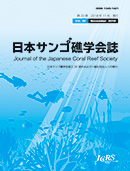Volume 25, Issue 1
Displaying 1-4 of 4 articles from this issue
- |<
- <
- 1
- >
- >|
Document
-
2023Volume 25Issue 1 Pages 1-18
Published: 2023
Released on J-STAGE: January 24, 2024
Download PDF (6558K)
Commentary
-
2023Volume 25Issue 1 Pages 19-25
Published: 2023
Released on J-STAGE: January 24, 2024
Download PDF (1034K)
JCRS award memorial paper
-
2023Volume 25Issue 1 Pages 27-44
Published: 2023
Released on J-STAGE: January 24, 2024
Download PDF (4384K)
Review article
-
2023Volume 25Issue 1 Pages 45-61
Published: 2023
Released on J-STAGE: January 24, 2024
Download PDF (2929K)
- |<
- <
- 1
- >
- >|
